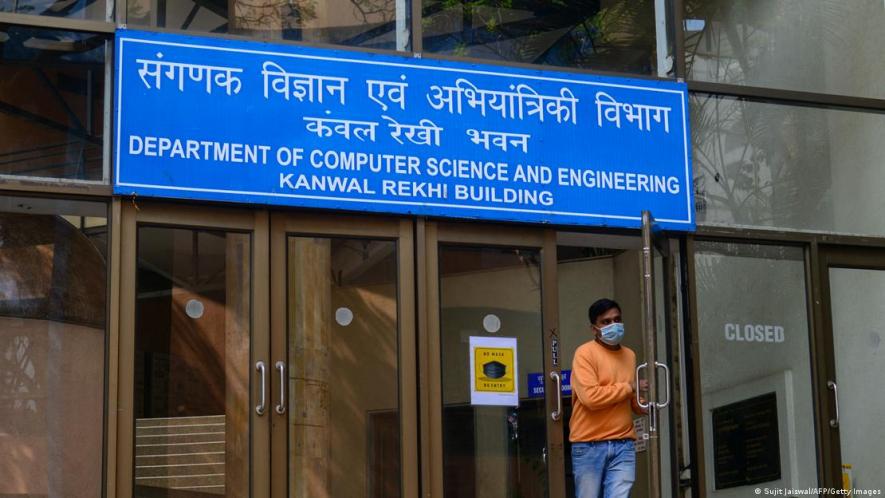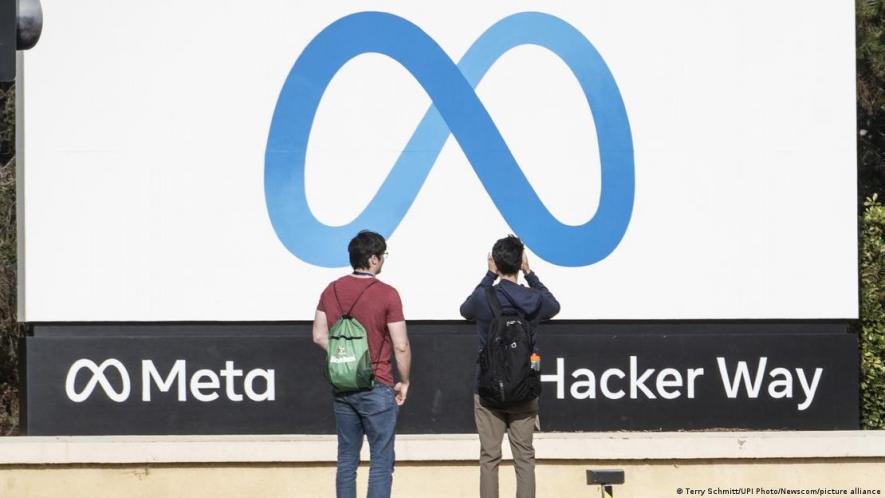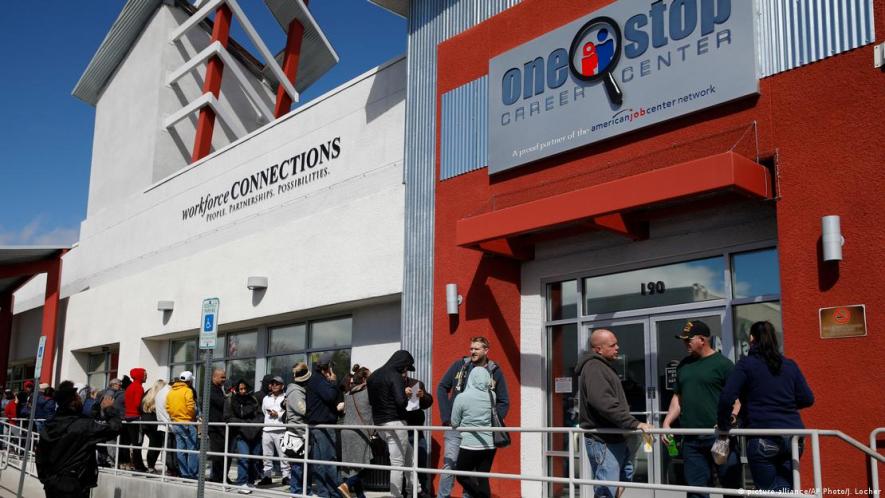US Job Cuts Leave Asian Tech Workers in Limbo

After working in the United States for two and a half years, Sujatha Krishnaswamy has become a victim of the current wave of tech job cuts in the country.
"Friday was my last day at Twitter," the IT specialist from India wrote on the LinkedIn jobs portal a few weeks ago. She said she had loved her work and her team, and that she had been proud of working at the social media company, only to add: "Unfortunately, my employer didn't love me back."
Companies like Facebook owner Meta, e-commerce behemoth Amazon and ride-hailing firm Lyft have announced job cuts in recent weeks as the US tech industry deals with an uncertain economic climate.
Rising interest rates and overcapacity in the industry have led to 46,000 job cuts in November alone, data from the US layoff tracker layoffs.fyi showed. The platform, listing laid-off employees to give them exposure to hiring companies, also said that foreign workers were being hit especially hard by the wave of dismissals.
Skilled foreigners caught up in a visa trap
For workers like Sujatha Krishnaswamy, who came to the US on a so-called H-1B visa, losing their jobs is threatening their residential status. Tech jobs accounted for about 70% of approved H-1B recipients in the fiscal year 2021. The visa allows US employers to hire foreigners for specialty jobs that require a bachelor's degree or an equivalent. H-1B visa holders can change companies, but have only 60 days to do so. If they don't find a new job within those two months they have to leave the country.
"These tech layoffs are something I have never witnessed before," said Mahir Nasir, a New York-based lawyer specializing in labor law. Working in the field since 2010, he's been surprised by the number of sacked IT specialists who previously worked for Meta, Twitter and Amazon and are now seeking his advice. "Many are from India and other countries in Asia," he told DW.

The Indian Institute of Technology in Mumbai trains a never-ending pool of tech workers who can be found in jobs around the world
The number of Asian nationals in the US tech industry is high because of a huge skills shortage in the country. Under H-1B visa requirements, US employers can fill a vacancy with a foreigner if there's no American worker available to do the job.
Since 2019, major US tech firms — Amazon, Meta, Lyft, Salesforce, Stripe and Twitter — together have filed visa applications for 45,000 foreign nationals, according to data from the United States Citizenship and Immigration Service.
Krishnaswamy was one of those tech professionals who had banked their professional fortunes on this insatiable hunger for foreign talent. She had worked at computer maker Dell for several years before switching to PwC for a brief stint at consulting. In May 2020, she began her Twitter career as a technical program manager in the Security & Privacy department.
"I worked day and night to successfully deliver critical user-facing privacy," even when she was heavily pregnant, she wrote on LinkedIn. "I gave my heart and soul every day to meet Twitter's Security and Privacy promises to users and regulators."
The dismissal in early November caught her totally off guard, she said, and it took her two days "to process what had just happened." She soon realized: "My H-1B visa is exacerbating my situation."
US visa riddle
US immigration authorities issue about 85,000 H-1B visas every year allowing recipients to stay in the country for a maximum of six years. Many of those who've secured temporary residential status are seeking to acquire a so-called green card via their employers which gives them a lawful permanent resident status.
Green card applicants who have lost their jobs not only lose their H-1B visas after six months, but will also lose the chance to get a green card if they don't find a new employer as a sponsor.
The number of foreign workers sponsored for green cards by US employers each year exceeds the annual statutory limit. In addition to this numerical limit, a statutory 7% per-country ceiling prevents the monopolization of employment-based green cards by a few countries. Applicants from India, Mexico and China are especially disadvantaged in this process due to the sheer number of applications from these countries.

At some American tech companies, foreigners make up almost 30% of the staff members
Immigration policy analyst William A. Kandel wrote in a 2020 special report to US Congress that "for nationals from large migrant-sending countries [...] the numerical limit and per-country ceiling have created inordinately long waits for employment-based green cards." Data provided by Kandel in the report show that for people from India the projected waiting time to receive a green card would be 195 years.
Possession of an H-1B visa not only allows foreigners to apply for a green card, but also allows them to buy property in the US and perhaps settle there permanently.
"Many H-1B workers have been in the United States for years. As a result, many have put down roots in the United States," said Julia Gelatt, a senior policy analyst with the Migration Policy Institute, an independent, nonpartisan think tank that seeks to improve US immigration and integration policies.
"The prospect of needing to either find a job within 60 days or leave the country is surely immensely stressful," she told DW.
Tough times for job-seeking foreigners
After years of a booming US tech industry, almost all major companies in the sector have stopped hiring for the time being. Startups, which used to employ significant numbers of foreigners on H-1B visas, are being squeezed financially by rising interest rates and dwindling access to venture capital.
Even those workers who are lucky enough to find a new job in these tough times cannot be sure to be allowed to stay in the US. Processing an H-1B visa takes authorities about three weeks, meaning foreigners have only another three weeks to find a new job after their dismissal. Many will have to leave the US before they can return.

With the tech boom ending in the US, new job offerings in the sector are hard to come by
An alternative for laid-off foreign workers would be to apply for a tourist visa that gives them the right to stay in the US for up to 180 days, buying them time to look for a new job. But the chances of an Indian national getting a tourist visa quickly enough are slim, immigration experts say. Current wait times for a B1/B2 visitor visa to the US are more than 900 days, according to the travel information website of the US State Department.
Some tech companies, at least, are aware of the troubles facing their sacked employees from abroad. Ride-hailing company Lyft, for example, has decided to keep its dismissed foreign staff a few weeks longer on its payroll, though without paying them. And Amazon has given laid-off foreigners 60 days to apply for a vacancy within the company before unenrolling them completely.
In India itself, developments in the US tech industry are not entirely unwelcome as domestic employers are hoping to benefit from the likely return of their highly skilled fellow citizens.
"With all the 2022 tech layoffs in the US, please spread the word to remind Indians to come back home," Indian businessman Harsh Jain wrote on Twitter.
With all the 2022 Tech layoffs (52,000+!) in the US, please spread the word to remind Indians to come back home (specially those with visa issues) to help Indian Tech realise our hyper-growth potential in the next decade! 🇮🇳 🇮🇳 🇮🇳 (1/3)
— Harsh Jain (@harshjain85) November 7, 2022
The co-founder and culture enforcement officer at Indian fantasy sports platform Dream11 is convinced they could all help "to realize our hyper-growth potential in the next decade."
This article was originally written in German.
Get the latest reports & analysis with people's perspective on Protests, movements & deep analytical videos, discussions of the current affairs in your Telegram app. Subscribe to NewsClick's Telegram channel & get Real-Time updates on stories, as they get published on our website.























